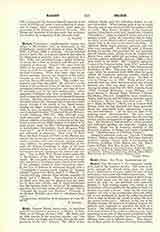

Hazart, CORNELIUS, controversialist, orator, and writer, b. October 26, 1617, at Oudenarde, in the Netherlands; entered the Society of Jesus, September 24, 1635; d. October 25, 1690, at Antwerp. He was ordained priest, April 6, 1647, at Louvain where he had already the reputation of perfectos orator; was professed on November 1, 1651; and preached during a period of thirty-six years, for a time at Dunkirk and Brussels, permanently at Antwerp. Hazart’s life, apart from the duties of his pastoral office, was almost exclusively taken up with the struggle against the Calvinists of the Low Countries. There were times when his activities extended beyond the frontiers of his native country, as was shown by his “Epistola ad Landgravium Hassiae-Rheinfeldtium”. This conflict was waged in part from the pulpit. He delivered at the church of the professed house, at Antwerp, a series of sermons on controverted questions, and some of these he preached even in the open marketplace, before numerous Calvinists who were assembled there for the festivities held in connection with church dedication services. His forte, however, lay rather in the domain of literary endeavor. Sommervogel enumerates about ninety writings of his, chiefly in the Dutch tongue. Among his larger systematized works it is worth while to note particularly the “Kerkelijke Historie van de gheheele wereldt” (Universal Church History), 4 vols. (Antwerp, 1667-73). This, although somewhat antiquated, perhaps, as a mission and church history, remains, nevertheless, serviceable to this day; it was translated into High German and added to by other Jesuits, under the title “Kirchengeschichte, das ist katholisches Christentum, durch die ganze Welt verbreitet”. All of Hazart’s writings are apologetic and polemical in character. They treat of Holy Mass, the Real Presence of Christ in the Blessed Sacrament, the invocation of the saints, the force of good works, auricular confession, extreme unction, purgatory, idolatry, the primacy and infallibility of the pope, the Roman Catechism, in short, of all those questions which, owing to the attacks of preachers, had become of more special present interest and concern. Next to Holy Writ, Hazart looked preferably to the Fathers of the first four centuries for his proofs. He was quick at refutation and showed himself a tactician of the highest order, but had the faults of the polemical writers of those tumultuous times. In the case of Schuler he contented himself with a “Vriendelyke t’saemen-spraek tuschen D. Joannes Schuler Predicant tot Breda ende P. C. Hazart” (A friendly colloquy between John Schuler, preacher of Breda, and P. C. Hazart). The estimation in which his books were held may be gleaned from the number of their new editions and of their translations into the German, from the retorts of his opponents, and from the fact that many of his writings, such as “Triomph der pausen van Roomen” (Triumph of the Roman Pontiffs), gave rise to voluminous literature.
N. SCHEID

